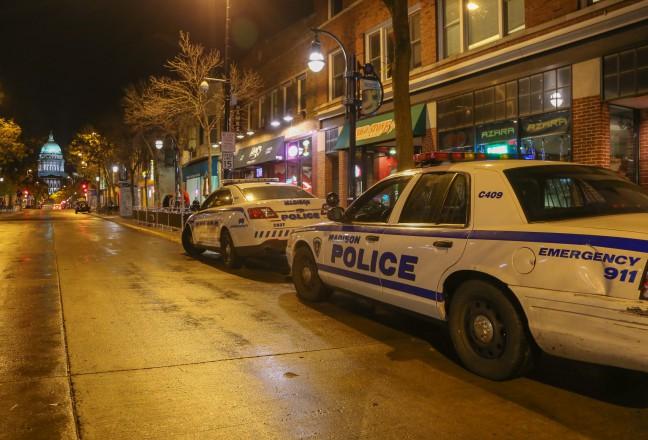Everyone knows how progressive the Madison Police Department is. Just ask MPD. From condemning ICE raids in Madison to enthusiastically welcoming programs like cultural competency training and body cameras, it seems like MPD is at the forefront of working to make policing humane and safe.
But what does the forefront of “humane” policing look like? From the perspective of many people not wearing badges, it looks a hell of a lot like regular policing. Because although Madison may load its officers with diversity training, arrest and detention rates for people of color in Madison are still jaw-droppingly disproportionate to those of white people. Though Chief Koval may grip the podium and wax eloquent about the trust his department is building with immigrant communities, his only real beef with ICE was that they didn’t let his department know about the raids.
Law enforcement looks to mend relationships with LGBTQ+ community after being uninvited from Pride
And what about those body cameras, those absolute darlings of liberals who would pluck the “bad apples” from the apple cart and send it on its way without another thought? Every sign would suggest that they won’t improve a thing. The largest study on the question to date found that the presence of police body cameras had no statistically significant effect on police use-of-force or complaints about police use-of-force. They did not increase the accountability of the police. They did not make the police a less oppressive institution. They did nothing.
One might be inclined to ask, with such threadbare evidence for the benefits of body cameras, why is Madison leaping at the chance to spend over a hundred thousand dollars on this Hail Mary? Simply put, it’s easier than the alternative.
MPD will splash the cash when it comes to shiny new gadgets or advanced psychological training, but there is no line item in their budget for “a critical reflection on the role of police in our society.” Perhaps that is too much to ask of them — truly uncommon is the institution that will honestly acknowledge its structural failings, particularly when it may lead to its demise.
Programs like body cameras and diversity training do not work because they are technocratic fixes for something that runs much, much deeper. It is a question of what it is police do — protect whom? Serve whom? There is a reason that community control of the police has been a recurring demand for marginalized groups for decades — they understand that the police do not work for them. The function of police in our society (based on their actions, not just their words) is to reproduce inequality and exercise social control.
Again, this not to say that every cop is explicitly racist, or that they want to jail poor people out of sadism. Actually, quite the opposite — the (sometimes genuine) lip service that cops in cities like Madison pay to progressive values makes it all the more difficult to identify their actual social role. If every police department in this country was filled with “colorblind” liberals, one could see roughly the same outcomes. That is because the outcomes of policing in this country are a function of maintaining “order” in a profoundly unequal society. Nearly 13 percent of Americans still live in poverty, yet cops are more likely to arrest shoplifters than they are bosses who steal tips and underpay their workers or focus on drug raids on poor —often black and brown — neighborhoods, it’s easy to reproduce inequality.
UW student prepares to release latest clothing line confronting police brutality, racism
That’s the fact of the matter. That’s what police do — it is what they have done for their entire history in this country. Reforming that aspect of police is like reforming a camel so it has no humps. It is no longer a camel — it is something new.
We aren’t going to fix police discrimination with cultural competency training. We won’t fix it with body cameras. The ways in which cops brutalize and repress people in this country are almost entirely legal and institutionalized. It’s time to look beyond police reform. It’s time to look beyond the police.
Sam Palmer ([email protected]) is a senior majoring in biology.





















